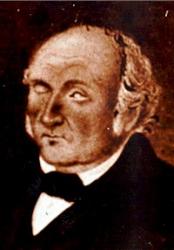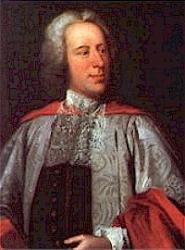Planning worship?
Check out our sister site, ZeteoSearch.org,
for 20+ additional resources related to your search.
- |
User Links
Person Results
Hugh Wilson
1766 - 1824 Person Name: Hugh Wilson (1766-1824) Composer of "MARTYRDOM" in The Hymnal Hugh Wilson (b. Fenwick, Ayrshire, Scotland, c. 1766; d. Duntocher, Scotland, 1824) learned the shoemaker trade from his father. He also studied music and mathematics and became proficient enough in various subjects to become a part-time teacher to the villagers. Around 1800, he moved to Pollokshaws to work in the cotton mills and later moved to Duntocher, where he became a draftsman in the local mill. He also made sundials and composed hymn tunes as a hobby. Wilson was a member of the Secession Church, which had separated from the Church of Scotland. He served as a manager and precentor in the church in Duntocher and helped found its first Sunday school. It is thought that he composed and adapted a number of psalm tunes, but only two have survived because he gave instructions shortly before his death that all his music manuscripts were to be destroyed.
Bert Polman
Hugh Wilson
Andrew Tait
1710 - 1778 Composer (attributed to) of "ST PAUL (ABERDEEN)" in The Irish Presbyterian Hymnbook
Andrew Tait
James McGranahan

1840 - 1907 Composer of "PSALM 103" in The Voice of Thanksgiving No. 2 James McGranahan USA 1840-1907. Born at West Fallowfield, PA, uncle of Hugh McGranahan, and son of a farmer, he farmed during boyhood. Due to his love of music his father let him attend singing school, where he learned to play the bass viol. At age 19 he organized his first singing class and soon became a popular teacher in his area of the state. He became a noted musician and hymns composer. His father was reluctant to let him pursue this career, but he soon made enough money doing it that he was able to hire a replacement farmhand to help his father while he studied music. His father, a wise man, soon realized how his son was being used by God to win souls through his music. He entered the Normal Music School at Genesco, NY, under William B Bradbury in 1861-62. He met Miss Addie Vickery there. They married in 1863, and were very close to each other their whole marriage, but had no children. She was also a musician and hymnwriter in her own right. For a time he held a postmaster’s job in Rome, PA. In 1875 he worked for three years as a teacher and director at Dr. Root’s Normal Music Institute. He because well-known and successful as a result, and his work attracted much attention. He had a rare tenor voice, and was told he should train for the operatic stage. It was a dazzling prospect, but his friend, Philip Bliss, who had given his wondrous voice to the service of song for Christ for more than a decade, urged him to do the same. Preparing to go on a Christmas vacation with his wife, Bliss wrote McGranahan a letter about it, which McGranahan discussed with his friend Major Whittle. Those two met in person for the first time at Ashtubula, OH, both trying to retrieve the bodies of the Bliss’s, who died in a bridge-failed train wreck. Whittle thought upon meeting McGranahan, that here is the man Bliss has chosen to replace him in evangelism. The men returned to Chicago together and prayed about the matter. McGranahan gave up his post office job and the world gained a sweet gospel singer/composer as a result. McGranahan and his wife, and Major Whittle worked together for 11 years evangelizing in the U.S., Great Britain, and Ireland. They made two visits to the United Kingdom, in 1880 and 1883, the latter associated with Dwight Moody and Ira Sankey evangelistic work. McGranahan pioneered use of the male choir in gospel song. While holding meetings in Worcester, MA, he found himself with a choir of only male voices. Resourcefully, he quickly adapted the music to those voices and continued with the meetings. The music was powerful and started what is known as male choir and quartet music. Music he published included: “The choice”, “Harvest of song”, “Gospel Choir”,, “Gospel hymns #3,#4, #5, #6” (with Sankey and Stebbins), “Songs of the gospel”, and “Male chorus book”. The latter three were issued in England. In 1887 McGranahan’s health compelled him to give up active work in evangelism. He then built a beautiful home, Maplehurst, among friends at Kinsman, OH, and settled down to the composition of music, which would become an extension of his evangelistic work. Though his health limited his hours, of productivity, some of his best hymns were written during these days. McGranahan was a most lovable, gentle, modest, unassuming, gentleman, and a refined and cultured Christian. He loved good fellowship, and often treated guests to the most delightful social feast. He died of diabetes at Kinsman, OH, and went home to be with his Savior.
John Perry
James McGranahan
David Evans
1874 - 1948 Person Name: David Evans, 1874-1948 Harmonizer of "ST PAUL (ABERDEEN)" in The Irish Presbyterian Hymnbook David Evans (b. Resolven, Glamorganshire, Wales, 1874; d. Rosllannerchrugog, Denbighshire, Wales, 1948) was an important leader in Welsh church music. Educated at Arnold College, Swansea, and at University College, Cardiff, he received a doctorate in music from Oxford University. His longest professional post was as professor of music at University College in Cardiff (1903-1939), where he organized a large music department. He was also a well-known and respected judge at Welsh hymn-singing festivals and a composer of many orchestral and choral works, anthems, service music, and hymn tunes.
Bert Polman
David Evans
Thomas Sternhold
1449 - 1549 Person Name: T. Sternhold Author of "O Thou My Soul!" in Redemption Songs Thomas Sternhold was Groom of the Robes to Henry VIII and Edward VI. With Hopkins, he produced the first English version of the Psalms before alluded to. He completed fifty-one; Hopkins and others composed the remainder. He died in 1549. Thirty-seven of his psalms were edited and published after his death, by his friend Hopkins. The work is entitled "All such Psalms of David as Thomas Sternhold, late Groome of the King's Majestye's Robes, did in his Lyfetime drawe into Englyshe Metre." Of the version annexed to the Prayer Book, Montgomery says: "The merit of faithful adherence to the original has been claimed for this version, and need not to be denied, but it is the resemblance which the dead bear to the living." Wood, in his "Athenae Oxonlenses" (1691, vol. I, p. 62), has the following account of the origin of Sternhold's psalms: "Being a most zealous reformer, and a very strict liver, he became so scandalized at the amorous and obscene songs used in the Court, that he, forsooth, turned into English metre fifty-one of David's psalms, and caused musical notes to be set to them, thinking thereby that the courtiers would sing them instead of their sonnets; but they did not, some few excepted. However, the poetry and music being admirable, and the best that was made and composed in these times, they were thought fit to be sung in all parochial churches." Of Sternhold and Hopkins, old Fuller says: "They were men whose piety was better than their poetry, and they had drunk more of Jordan than of Helicon." Sternhold and Hopkins may be taken as the representatives of the strong tendency to versify Scripture that came with the Reformation into England--a work men eagerly entered on without the talent requisite for its successful accomplishment. The tendency went so far, that even the "Acts of the Apostles" was put into rhyme, and set to music by Dr. Christopher Tye.
--Annotations of the Hymnal, Charles Hutchins, M.A. 1872.
Thomas Sternhold
Neil Dougall

1776 - 1862 Person Name: Neill Dougall, 1776-1862 Composer of "KILMARNOCK" in The Irish Presbyterian Hymnbook Born: December 9, 1776, Greenock, Renfrewshire, Scotland.
Died: October 1, 1862, Greenock, Scotland.
Buried: Greenock, Scotland.
Neil’s father, wheelwright Neill Dougall, was drafted into the army, and died in Ceylon (now Sri Lanka) when his son was only four years old. At age 15, Neil became an apprentice on the ship Britannia. In 1795, while he was loading a gun to fire the second volley of a salute to commemorate Lord Howe’s victory over the French, an explosion blinded him and took his arm. After recovering, he began his musical career. In 1798, he attended a singing class under Robert Duncan, and in the fall of the next year opened his own class, which he ran until 1844. He gave annual concerts in Greenock from 1800 [sic, Frost] to 1860.
--www.hymntime.com/tch
Neil Dougall
Thomas Jackson
1715 - 1781 Composer of "JACKSON" in The Presbyterian Book of Praise Jackson played the organ at Newark, England (1768-81). His works include:
Twelve Psalm Tunes and Eighteen…Chants, circa 1780
--www.hymntime.com/tch
Thomas Jackson
Elizabeth Howard Cuthbert
1800 - 1857 Person Name: Elizabeth H. Cuthbert Composer of "HOWARD" in The Hymnbook Howard was a native of Dublin, Ireland.
--www.hymntime.com/tch/
Elizabeth Howard Cuthbert
Maurice Greene

1696 - 1755 Person Name: Maurice Greene, 1696-1755 Composer of "ST. NICHOLAS (Greene)" in The Cyber Hymnal Born: August 12, 1696, London, England.
Died: December 1, 1755, England.
Buried: Originally at St. Olave’s, Old Jewry. On the demolition of St. Olave’s, his remains were moved to St. Paul’s and placed in Boyce’s grave, May 18, 1888.
Maurice Greene (12 August 1696 – 1 December 1755) was an English composer and organist.
Born in London, the son of a clergyman, Greene became a choirboy at St Paul's Cathedral under Jeremiah Clarke and Charles King. He studied the organ under Richard Brind, and after Brind died, Greene became organist at St Paul's.
With the death of William Croft in 1727, Greene became organist at the Chapel Royal, and in 1730 he became Professor of Music at Cambridge University. In 1735 he was appointed Master of the King's Musick. At his death, Greene was working on the compilation Cathedral Music, which his student and successor as Master of the King's Musick, William Boyce, was to complete. Many items from that collection are still used in Anglican services today.
He wrote very competent music in the Georgian style, particularly long Verse Anthems. His acknowledged masterpiece, Lord, let me know mine end, is a representative example. Greene sets a text full of pathos using a polyphonic texture over a continuous instrumental walking bass, with a particularly effective treble duet in the middle of the work. Both this section and the end of the anthem contain superb examples of the Neapolitan sixth chord.
--en.wikipedia.org/wiki/
Maurice Greene


 My Starred Hymns
My Starred Hymns


